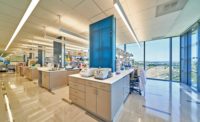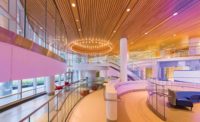Siemens Healthineers’ Advanced Manufacturing and Research & Development Facility
East Walpole, Mass.
Best Project
Owner: Siemens Healthineers
Lead Design Firm, Civil/Structural/MEP Engineer and Architect: Jacobs Engineering
Construction Manager: Columbia
Project Controls: PMA Consultants
Structural Steel: Canatal Industries
Landscaping: Emanouil Inc.
Electrical: J&M Brown Co.
Plumbing/Mechanical: J.C. Cannistraro
Sitework: Lawrence Lynch Corp.
During the plant’s goundbreaking in East Walpole, Mass., a board member at Siemens said the addition and renovation of more than 300,000 sq ft of space would be “critical” to distributing their blood test kits worldwide. “Little did anyone attending this event in 2017 ever conceive that we would be experiencing a worldwide pandemic in 2020,” says Greg Keller, project executive at Columbia, the project’s construction manager. Keller adds that following the project’s completion, Siemens was able to “immediately start producing and distributing over 30 million COVID-19 test kits per month.”
Major construction work took place on an already busy campus running full steam amid the pandemic at multiple manufacturing, warehousing, office and research buildings. “Working on an active campus within a very regulated industry such as lab space requires constant attention to safety,” one judge observed.
Extensive planning and teamwork were required to pull off 42 individual but interrelated projects during a three-year period without interrupting work at the complex, which, along with COVID-19 test kits, produces more than 1 billion blood tests each year.
For example, expanding the highly regulated quality control lab essential to manufacturing originally called for a contained, 23-month three-phased plan. Instead, the team saved six months by moving the QC operation to a temporary location so the expansion could be completed. The team said a “quality move plan” allowed for continuous operations during relocation.
There were no down times at the plant, which runs 24 hours a day, seven days a week, making for “one of the most complex and challenging pharmaceutical expansion and renovation projects ever undertaken,” Keller says.
Overall, the project was split between renovation of 160,000 sq ft of space across the existing five buildings on the campus and 157,000 sq ft of new space through the construction of a sixth building and additions to two existing buildings. Along with new office, warehousing, lab and common area space, the project also included the construction of ISO 8 clean room manufacturing areas, renovations of process systems within operational clean spaces, eight specialized cold storage environmental rooms, new clean utility systems and a campuswide environmental monitoring system.
Other major site modifications included expanded surface parking and upgraded campus electrical infrastructure.
The $310-million LEED Gold project’s contribution to countering the pandemic is ultimately what impressed the judges the most. “The production of those tests is something that we’re going to be dealing with for a while at least,” one judge said.







